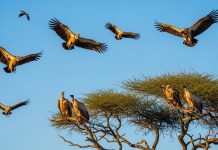There is a sudden rise in demand for donkey skin in Nigeria and this is causing a rapid collapse in donkey population in the country. There is also a growing number of underground sellers of donkey skin. And authorities in the country are moving to combat the rapid depletion of the species population.
The Nigeria Agricultural Quarantine Service (NAQS) raised these concerns Wednesday in a statement made available by
Head of Media, Communications and Strategies, NAQS, Dr. Gozie Nwodo.
Read also: An Alleged Wildlife Trafficking Kingpin Evaded Prosecution
Director-General, NAQS, Dr. Vincent Isegbe, in the statement reminded audience that Nigeria is a signatory to the Convention on International Trade in Endangered Species, CITES, therefore Nigeria is obligated to institute all reasonable safeguards to protect the surviving breeds of donkeys within her borders from the possible threat of biodiversity loss and extinction.
The global population of donkeys has suffered a collapse over the past decade, Isegbe revealed. The impact of climate change is projected to aggravate their depletion, hence efforts to conserve the species are required urgently.
“The rise in demand for donkey skins has fostered a ravenous underground market for the product, resulting in a relentless open season on the donkey population,” Isegbe said.

This is why a balance must be found between conservation of the species and its use for economic purpose.
“This is a delicate balancing act that calls for the structuring and standardization of the value chain in order to maintain and restock the national herd population of donkeys by improved breeding, ranching, and other innovative ways,” he added.
NAQS’ strategy to curtail the bad business is to “place value and viability” on Nigerian donkeys. This requires formalizing the export trade in donkey skins, setting the code for the management of the chain of custody and ensuring that traceability is obtainable at all points and from all angles of human interaction with donkeys.
Read also: #SaveTheVultures: They need all the help
“The Quarantine Service will engage all stakeholders as much as possible to achieve these fundamentals in order to make the export trade in donkey skin advantageous for everybody, including generations unborn.”
Head of Animal Quarantine Department, NAQS, Dr. Abidodun Akinjo, fingers non-Nigerians as big players in the illegal donkey trade.
“Despite the prohibition, we noticed that there were considerable donkey skin transactions afoot. In the past three months, we have worked hard to disorient the network behind this illicit activity,” Akinjo said.
“We found out that foreign nationals were inducing and instigating this wanton depopulation of Nigerian donkeys.”
Akinjo maintained that black market buyers of donkey hides in Asia have spent time and resources to cultivate a loyal supply network in Nigeria.
Donkeys from Nigeria are in high demand in China, where their hides and bones are used in traditional medicine. The skins are boiled to produce a gelatin known as ejiao, which is used in Chinese medicine to cure anything from coughs to blood circulation.
In 2016, it was estimated that around 156,000 donkeys were exported to China from Maigatari, a border town market in Jigawa, less than two minutes drive from Republic of Niger.
“The sole interest of the donkey skin dealers is instant profiteering. Hence, they do not spare a thought beyond the exchange of money for donkey skin. Neither do they care about breeding donkeys to maintain the carrying capacity of the animals to ensure the perpetuity of the goose that lays the golden eggs,” he added.
Since last year, the federal government has been in talks with investors on commercial breeding of the species to curb the black market.
Concerns were also raised about the environmental hazards and public health issues resulting from the sourcing, transportation, slaughtering, and flaying of the donkeys for export.
“That is why the NAQS is embarking on joint special operations with the police across the country and at all interstate control posts to checkmate export-bound stockpiling of donkey skin”, Akinjo said.

















